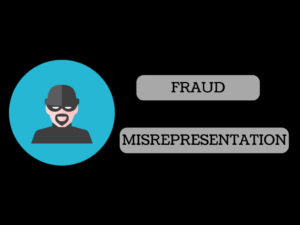Fraud vs Misrepresentation: Understanding the Key Differences
What is Fraud?
Fraud refers to the deliberate act of deceiving someone for personal gain or to cause harm. It involves intentional misrepresentation, concealment of facts, or false statements made with the intention to deceive. Fraud can occur in various contexts such as business transactions, financial dealings, or legal matters.
Examples of Fraud:
1. Identity Theft: Using someone else’s personal information to commit financial fraud.
2. Ponzi Scheme: A fraudulent investment scheme where early investors are paid with new investors’ funds.
3. Insurance Fraud: Submitting false claims or misrepresenting information to obtain insurance benefits.
Uses of Fraud:
1. To unlawfully obtain money or assets.
2. To manipulate stock prices and gain an unfair advantage in trading.
3. To deceive individuals or organizations for personal gain.
What is Misrepresentation?
Misrepresentation involves making false statements, whether by words or actions, with the intent to deceive another person. It can occur in various contexts such as contracts, sales, or advertising. Unlike fraud, misrepresentation may not always involve an intention to cause harm or personal gain.
Examples of Misrepresentation:
1. Advertising Claims: Misleading statements about the benefits or features of a product.
2. Real Estate Misrepresentation: Providing incorrect information about the condition or value of a property.
3. Employment Misrepresentation: Providing false information on a resume or during a job interview.
Uses of Misrepresentation:
1. To convince someone to enter into a contract or agreement.
2. To gain a competitive advantage in business negotiations.
3. To avoid legal obligations or responsibilities.
Differences Between Fraud and Misrepresentation:
| Difference Area | Fraud | Misrepresentation |
|---|---|---|
| Basis of Action | Intentional deception | False statements without necessary intent |
| Intent | Intention to cause harm or personal gain | Intent may vary (not necessarily for personal gain or harm) |
| Legal Consequences | Criminal offense in most jurisdictions | Civil offense, but may have legal consequences |
| Deception Level | Higher level of deception | Less severe level of deception |
| Proof | Requires proving intent to deceive | Focuses on showing false statement or action |
| Typical Contexts | Financial fraud, business transactions | Contracts, sales, advertising |
| Intent to Cause Harm | Intention to harm or defraud the victim | May not necessarily involve intention to cause harm |
| Severity | Considered a serious offense | May not always be perceived as a serious offense |
| Awareness | Defendant is aware of the falsity of the representation | Defendant may or may not be aware of the falsity |
| Remedies | Criminal penalties, fines, imprisonment | Civil remedies, such as damages or contract cancellation |
Conclusion:
In conclusion, fraud and misrepresentation both involve the act of providing false information or making false statements. However, fraud entails intentional deceit with the intent to cause harm or gain an unfair advantage, whereas misrepresentation may not always involve malicious intent. While fraud is generally considered a criminal offense, misrepresentation is often treated as a civil matter. It is important to understand these key differences to protect oneself from potential legal or financial implications.
People Also Ask:
Q: What are the potential legal consequences of fraud and misrepresentation?
A: Fraud is typically considered a criminal offense and can result in criminal penalties such as fines and imprisonment. Misrepresentation, however, is usually a civil offense, leading to potential remedies such as damages or contract cancellation.
Q: How can one prove fraud or misrepresentation in legal proceedings?
A: To prove fraud, one must demonstrate the intent to deceive, typically by showing evidence of intentional misrepresentation or concealment of facts. In the case of misrepresentation, the focus is on proving the false statement or action without necessarily needing to establish the intent to deceive.
Q: Are there any defenses against fraud or misrepresentation accusations?
A: Common defenses against fraud or misrepresentation include lack of intent, innocent misrepresentation, and absence of justifiable reliance on the false statement. Each case may require specific legal analysis based on the circumstances and applicable laws.
Q: How can individuals protect themselves from fraud or misrepresentation?
A: It is essential to exercise caution and conduct due diligence when entering into agreements or transactions. Verifying information, reading contracts thoroughly, and seeking legal advice when necessary can help prevent falling victim to fraud or misrepresentation.
Q: What are the typical industries or areas where fraud and misrepresentation occur?
A: Fraud can occur in various industries, including finance, insurance, real estate, and commerce. Misrepresentation commonly takes place in fields such as sales, advertising, marketing, and contract negotiations.


